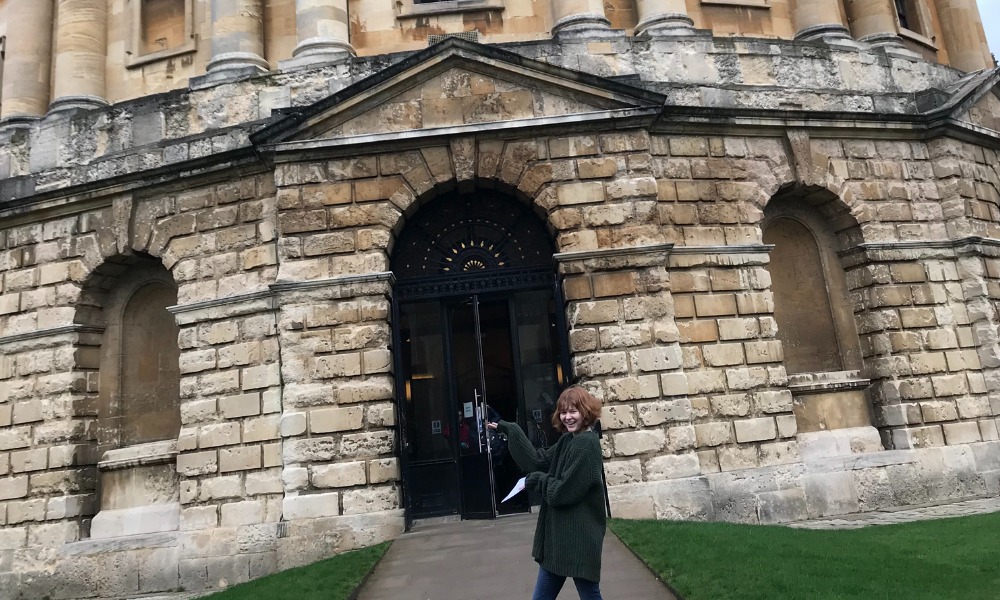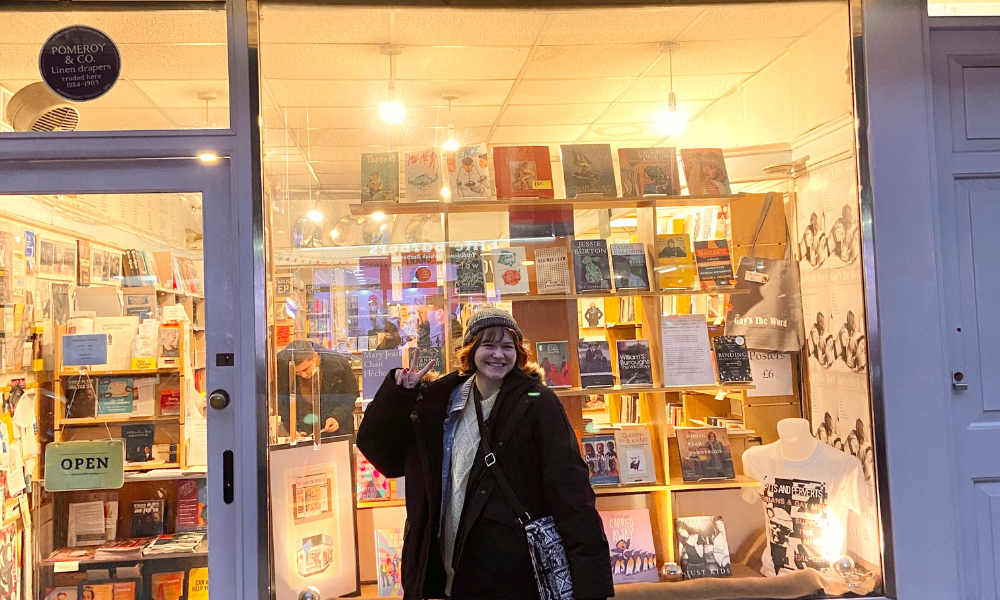Dynamics of Social Movements
Independent ScholarsSUMMARY: Junior Kearney Quillen brings together interests in collective responsibility, political philosophy, and economic justice in self-designed curriculum

Kearney Quillen came to JMU from Purcellville, Virginia, a small Loudoun County town surrounded by apple orchards and vineyards. Kearney’s mother works at one of the local wineries. Her stepfather Mike is a facility engineer for computer servers in Dulles, in the Northern Virginia exurbs. Kearney attended nearby Loudoun Valley High School. She describes herself as just a little hyperactive: “When I get excited about something I have a hard time managing my personal oral volume.”
One of her favorite teachers was Michael Skvarch, a physics teacher at LVHS. “He was so optimistic,” Kearney remembers. “He had so many plans, but believed that he should mainly be a facilitator or guide who goes alongside you and helps you discover things and figure things out.” Kearney’s English teacher Rachel Finney assigned students to do TED-style talks and slam poems, which she enjoyed immensely. “She sometimes wrote thank you cards to us rather than assigning fixed grades.” Kearney also served as a teaching assistant to Shelly Burkett in AP Psychology. “It was fun because I got to grade the vocabulary tests,” says Kearney. “I like the subject and got to review stuff that I didn’t fully understand the first time around.” Kearney also took several years of Latin with Michael Krepich, and lots of mathematics with Terri McConnell. “My mom and Ms. McConnell wake up at 4 AM and go running together. Did I mention this is a small town?” she laughs.
Kearney joined the LVHS debate team in her junior year, competing in Lincoln-Douglass public forum debate formats. “Our debate team was basically four people plus a couple of hangers-on who did their own thing. We four were all co-captains in our senior year.” Kearney says that debate really helped her perform in JMU classes, as it helped her find flaws in logic and merits in arguments. “I had a lot of fun in Philosophy 101 at JMU because of my experience in Lincoln-Douglass debates: ‘Should constitutionally protected (hate) speech be allowed on college campuses?’ There’s a lot of philosophy in the answer to a question like that.” Kearney learned a great deal about John Rawls’ original position, often referred to as the ‘veil of ignorance,’ and the categorical imperative, the central concept in the deontological moral philosophy of Immanuel Kant.
“I really like the JMU campus and the variety in course offerings. I’ve made good friends here: Jesse, Jacob, and Lucas, and Sydney from our Independent Scholars class,” Kearney reflects. She is double majoring in Sociology and Independent Scholars, with a minor in Honors Interdisciplinary Studies. Kearney picked Sociology because she liked history, psychology, anthropology, and the discipline seemed like the intersection of all of those things. “There are so many things that I want to learn.” The Independent Scholars major allowed her to explore even more areas. “Because of Independent Scholars I understand why I have the interests that I do, and the major also helped me corral those interests. Instead of just being a tangled web of different things that I want to learn, I’ve systematically identified the intellectual branches that I want to follow.”

Kearney has become interested in how small communities and movements affect mainstream culture and eventually result in big culture changes. Kearney also wants to become a professor, and sees in Independent Scholars a graduate training ground that focuses interests and develops academic skills, while also granting freedom to explore new territory and not simply repeat what others have learned. “The idea of spending my life doing research to add to the fund of public knowledge really appeals to me.” Kearney’s interdisciplinary interests align well with the Independent Scholars program. “If you are mainly interested in one field, it’s not for you,” she says. “But if your interests are broad, or combine knowledge from lots of fields, this major is for you.”
Growing up in a small town led Kearney to develop global aspirations. In 2020, Kearney completed two terms at the University of Oxford through the JMU Oxford Program. An Oxford education emphasizes self-directed learning, one-on-one meetings with faculty members, and regular writing and critical reflection. Kearney wanted to learn at Oxford about the divisions of socialist thought, and the contexts in which they have been applied. She enrolled in courses on Marxism (Luke Lattanzi-Silveus), Socialism (Oliver Gough), Hitler and Fascism (Thomas Heyen-Dube), and Homer and Greek Mythology (Richard Rutherford). “I did two meetings each week. Six meetings over an eight week span,” Kearney explains. “Each professor emails you a reading list and a list of possible prompts. You spend the week doing the reading and then two or three days writing an essay. You send it in 24 hours before the meeting so they can read it ahead of time.” Says program director Jared Diener, “Oxford isn’t for the faint of heart. It’s intense, with high expectations for reading, writing, and critical analysis. And it’s intimidating to sit down with an Oxford professor and have to defend your arguments on the spot. Students who accept the challenge come through better prepared to tackle difficult problems and more confident in their own abilities.”
Kearney reports that she reached a turning point in her education in the first Oxford term, as connections between her studies and the events of the world were becoming clear. She got involved with an organization called Bernie Abroad on her way to a British pub. “They were handing out stickers. It’s an American primary and there are our campaign posters hanging in the UK. What’s up with that? I thought, ‘You know you can’t vote in the primaries right?’” Upon her return to the U.S., Kearney participated in several BLM protests, in Manassas and Woodbridge, Virginia, and the District of Columbia. “I want to be well-versed in the theory,” says Kearney, “but I also want to actively help people.”
Recently, she has been writing about such topics as late capitalism, automation and the future of work, socialism and freedom, and leftist history for the new Independent Scholar e-zine. “If you’re going to make change it can’t just be about tearing things down. It needs to be about building back a foundation,” Kearney says. “The universe is indifferent, but you ought not to be.” Kearney believes in radical kindness. “You are not obligated to complete good work,” she says, “but neither are you entitled to abandon it.”

